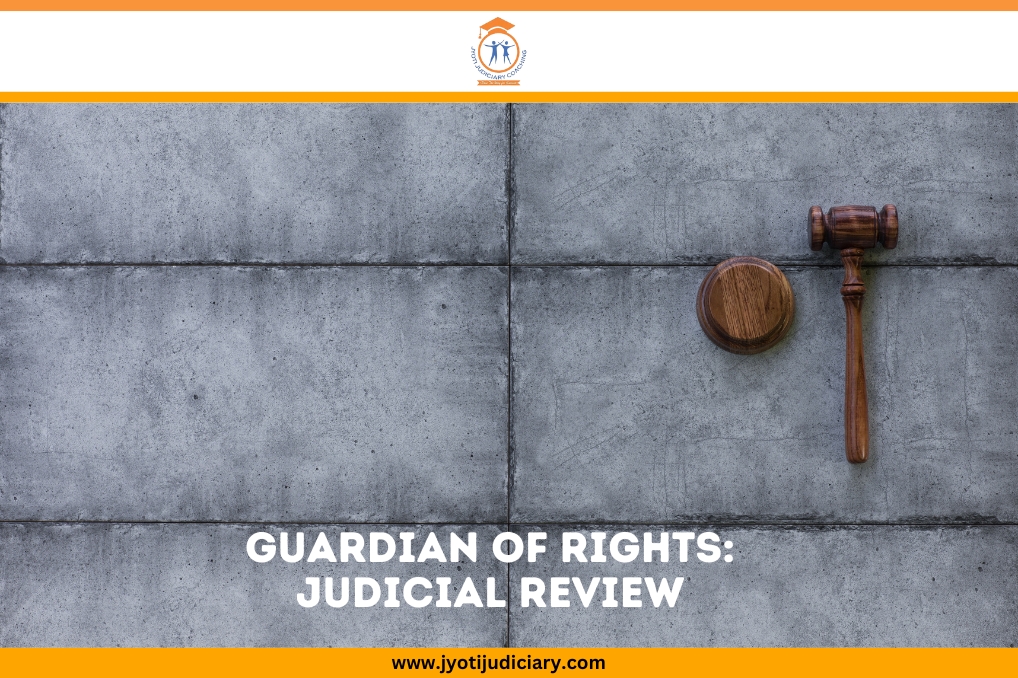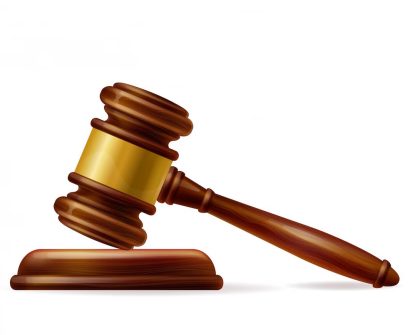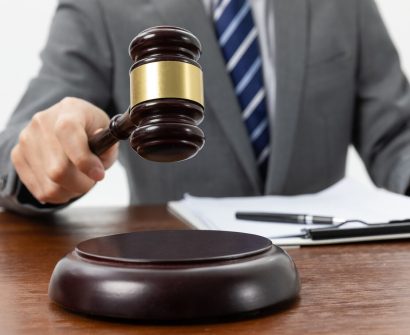
The division of powers between the arms of government is essential in any democracy to protect the fundamental liberties and rights of its citizens. The judiciary serves as one of these branches that safeguards rights by upholding the Constitution while making sure that the executive and legislative branches operate in a way that is simultaneously legal and constitutional. The notion of judicial review, an essential component of contemporary constitutional democracies, is at the core of this responsibility.
Judicial Review: Overview
- As per the judicial review meaning, it refers to the framework that the judiciary uses to assess and examine actions taken by the government’s legislative and executive branches. Even while India simultaneously upholds the notion of the separation of powers between the three wings, i.e., the executive, legislative, and judicial branches, the court is empowered to assess how the other two arms of the state are operating under this principle.
- Article 13(2) of the Indian Constitution clearly stipulates that any action that infringes on a fundamental right shall be deemed unconstitutional, null, and invalid.
- The Supreme Court of India is empowered by Article 32 of the Indian Constitution to protect the fundamental rights outlined in Part III of the Grundnorm. This gives persons the right to make any direct complaint with the SC to seek compensation for infringements on their constitutionally protected fundamental rights.
Administrative Law Judicial Review
- The core of administrative law is, in a sense, judicial review of administration. It is certainly one of the most appropriate means of enquiring about the legal competence of a public entity.
- The competence of the public authority, the extent of the public authority’s legal powers, the sufficiency and fairness of the procedure, the evidence taken into consideration for the administrative decision and the reasons behind it, and the nature and scope of the discretionary power are the components of an official decision or an act of administration that may be examined by the legal process.
Judicial Review Constitution: Its Relevance
- One of the most powerful pillars supporting the supremacy of our Constitution is the relevance of judicial review.
- The judicial review procedure limits the misuse of the legislative and executive branches’ authority and power.
- Judicial review serves as a tool for protecting and preserving individuals’ fundamental rights; this idea elegantly ensures the independence of the Indian judiciary.
Concept of Judicial Review: Its Types
The following are the major judicial review types:
- Legislative Procedure Reviews: This review proposes the power to confirm that laws passed by the legislature comply with the provisions of the Constitution.
- Reviews of Executive Processes: Administrative authorities may utilize this tool to impose constitutional discipline when exercising their authority.
- Judiciary Decision Reviews: A few instances of this are the cases of Golaknath, Minerva Mills, Nationalization of Banks, Elimination of Privy Purses, and others.
Judicial Review in India: Its Drawbacks
The judiciary’s capacity to carry out judicial review is subject to many limitations. The following are some drawbacks of judicial review:
- It limits the governing body’s ability to take action.
- Once the judges’ opinions have been gathered in any case, they become the standard by which subsequent cases are settled; only then is it fair to specify the extent to which it demonstrates whether the decision and the reasoning behind it were made appropriately.
- Higher courts, including the Supreme Court of India and other courts, are permitted to use it.
- Frequent court intervention could erode public confidence in the management’s integrity, competence, and effectiveness.
- It is not the place of the judiciary to get involved in politics or policy problems unless it is essential.
- In addition to potentially harming the public at large, it could influence decisions that are driven by selfish or private interests.
- Moreover, it goes against the legally mandated cap on the use of authority to supersede any current laws.
Judicial Review: Important Case Laws
- The 1951 First Amendment Act was challenged before the Supreme Court in the case of Shankari Prasad v Union of India. The opponents argued that Article 13(2) of the Constitution did not permit the Act’s limitation of their “Right to Property.” The Supreme Court rejected the claim, ruling that the provisions of Article 368 are wholly general and grant the parliament the exclusive power to amend the constitution.
- The Supreme Court struck down Section 4 of the 42nd Amendment Act, which granted the directive principles control over Articles 24, 19, and 31 of our Constitution, by a majority decision in the Minerva Mills case. As it would declare that Parts III and IV are equally important and cannot have absolute precedence over the other, undermining the cohesion of the Indian Constitution. Thus, interpreting the various provisions of the constitution helps ensure that laws are appropriately implemented across the country.
Judicial Review FAQs
1. What are the limitations of the judicial review?
A number of privileges and immunities are granted by the Constitution to the President, Governors, and Supreme Court and High Court judges. Unless these people have acted in their individual capacities, the courts are not permitted to investigate their actions.
2. What is not subject to judicial review?
The advice provided to the president by the Council of Ministers, the governor’s discretionary power when acting alone, the dissolution of the state legislature, the appointment of the chief minister, and the parliamentary privileges granted to members of parliament are not covered by the power of judicial review.
3. What is the function of the judicial review?
In India, the Supreme Court as well as the High Courts of India use the process of judicial review to look into, rule against, and annul any Executive or Legislative activities that are at odds with the Indian Constitution.
4. What are the 5 grounds of judicial review?
Common grounds for judicial review include improper procedural conduct, irrationality, proportionality, error of jurisdiction, and legitimate expectations.
5. Who has the power of judicial review?
The authority to conduct judicial reviews has been granted to the Supreme Court. It implies that the Supreme Court has the authority to examine its ruling. Judicial review is the process by which a court of law decides whether or not a legislative act is constitutional
6. Is judicial review a basic structure?
The power of judicial review has been proclaimed by the Supreme Court to be a fundamental component of the Constitution’s framework.
7. Does the District Court have judicial review?
Judicial review is the process by which the judiciary interprets the Indian Constitution and, in the event that it finds a statute or executive order to conflict with it, declares it void. The Indian Supreme Court and High Courts both use their judicial review authority.
8. Is judicial review based on the rule of law?
Article 21 of the Indian Constitution states that “Procedure established by law” governs judicial review. Before a law may become a law, it must pass the constitutionality test.
9. What is judicial overreach?
Judicial overreach occurs when the court surpasses its own boundaries and enters the legislative and executive branches of government, impeding their ability to carry out their respective tasks. In a democracy, judicial overreach is viewed as undesirable.
10. Is judicial review only for fundamental rights?
Under the doctrine of judicial review, the Supreme Court or High courts have the authority to declare a law passed by the state legislature or Parliament to be invalid if it attempts to restrict or eliminate an individual’s fundamental rights.
With the goal of giving students the best coaching available for law entrance exams including the CLAT, AILET, and various other numerous state judiciary exams, Jyoti Judiciary Coaching, India’s Finest educational Platform, was established. Come enroll now with Jyoti Judiciary!
For any latest news, legal topics, judiciary exams notifications, patterns, etc watch Jyoti Judiciary’s YouTube channel for legal videos for any updates at https://youtube.com/@jyotijudiciarycoaching4852?si=2cwubh9d2A9urwJf









